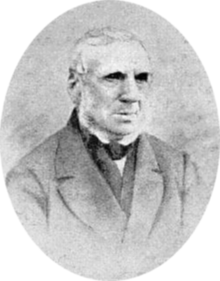This article needs additional citations for verification. (August 2010) |
Captain James FitzGibbon | |
|---|---|
 | |
| Born | 16 November 1780 Glin, County Limerick, Ireland |
| Died | 10 December 1863 (aged 83) London, England |
| Allegiance | Great Britain United Kingdom Upper Canada |
| Service | British Army Colonial militia in Canada |
| Years of service | 1795–1825, 1837 |
| Rank | Captain |
| Battles / wars | |
James FitzGibbon (16 November 1780 – 10 December 1863) was a public servant, prominent freemason of the masonic lodge from 1822 to 1826 (holding the highest position in Upper Canada of deputy provincial grand master),[1] member of the Family Compact, and an Irish soldier in the British Army in Europe before and in the Canadas during the War of 1812[2] who received messages of warning from two Canadian folk heroes: Laura Secord (Ingersoll) and Billy Green.[3]
James held many titles with Upper Canadian society after the War of 1812, and before the Rebellions of 1837-1838 would be considered a prominent Canadian Tory and a "prime example of government patronage" by William Lyon Mackenzie.[1]
It is noted that the Rebellion of 1837 in Upper Canada brought out "the peak of FitzGibbon's career"[1] and he would be made the acting adjutant-general of militia in Upper Canada, but FitzGibbon would retire the day after the Battle of Montgomery's Tavern, citing "Head's treatment". This "treatment" was likely Head's preferential choosing of Allan MacNab over FitzGibbon first in leading the attack on Montgomery's Tavern.[3]
FitzGibbon would argue in a pamphlet called An appeal to the people of the late province of Upper Canada submitted to the British government in 1847 that he and his actions had "saved Upper Canada for the Empire" during the Rebellions of 1837–1838, but nothing came from it.[3]
FitzGibbon's biography notes him essentially as having been an extremely effective man in his career who was cheated of any real reward beyond recognition. FitzGibbon was "intensely loyal (to the crown) and had a keen mind, but lacked the formal education, wealth, and social background that would have enabled him to penetrate the ranks of office in the army or government". Nevertheless, FitzGibbon is still noted as being "a conscientious, capable, and zealous public servant until he became overburdened with debt and grew obsessed by the injustice of the long delay in granting him his well-earned reward".[3]
- ^ a b c "Biography – FitzGIBBON, JAMES – Volume IX (1861-1870) – Dictionary of Canadian Biography". www.biographi.ca. Retrieved 29 June 2023.
- ^ Ridler, Jason. "James FitzGibbon". The Canadian Encyclopedia. Retrieved 8 May 2017.
- ^ a b c d "Biography – FitzGIBBON, JAMES – Volume IX (1861-1870) – Dictionary of Canadian Biography". www.biographi.ca. Retrieved 30 June 2023.